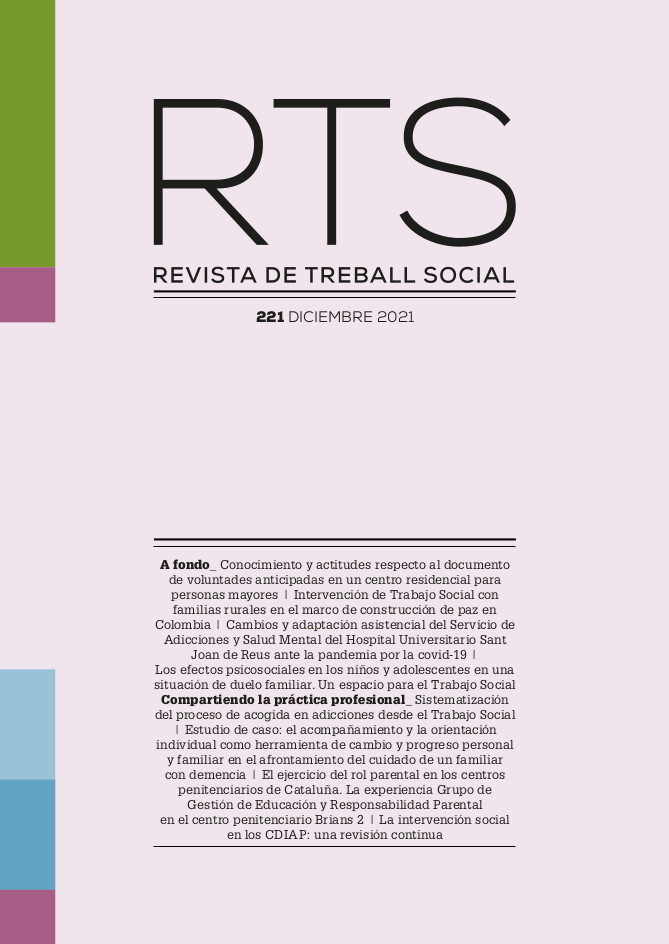In this paper we aim to describe the adaptation process that the Addictions and Mental Health Service of Sant Joan de Reus University Hospital underwent during the lockdown declared due to the Covid-19 pandemic. First of all, we examine how these technical changes take place with regard to being able to deliver telecare (psychotherapy, medical and
social monitoring) to patients who needed it, as well as assessing the suitability of these telecare systems – which are likely to remain in use after the lockdown – and the assessment by patients and professionals. In order to carry out this study, the truncated training placements of eleven students were transformed in order to train them as interviewers, allowing them to form part of the fieldwork questionnaire design team. The team from the Addictions and Mental Health Service of Sant Joan de Reus University
Hospital also launched a telephone helpline for emotional support for all hospital workers, especially those who were on the frontline. Given the urgency the situation called for, the scant preparation and lack of experience in these situations coupled with the psychological pandemic context, we sought to highlight, describe and share those elements that have led our service to become an example of organizational resilience, delivering a swift, adapted response to the needs of our patients, professionals and students on training placements by means of an interdisciplinary approach.
Article
Changes and healthcare adaptation of the Addictions and Mental Health Service of Sant Joan de Reus University Hospital in the face of the Covid-19 pandemic
Almazán C., Espallargues M., Oliva G. (2002). Dissenys d’estudi en recerca clinicoepidemiològica. Part I: estudis descriptius. Pediatria Catalana, 62, 196-205. Annals de Medicina. http://webs.academia.cat/revistes_elect/view_document.php?tpd=2&i=1490
Andaluz, L., Cid Outeirño, M., Mosquera Vázquez, A. M., Rodríguez Sierra, M., Vázquez Pombo, A., y Vilar Pumares, M. (2020). Evolución de la intervención social en el ámbito hospitalario en contexto de Covid 19. Experiencia y transformación en el Servicio de Trabajo Social del CHUAC. Servicios Sociales y Política Social. XXXVII (monográfico especial), 169-175. Servicios sociales y política social.https://www.serviciossocialesypoliticasocial.com/evolucion-de-lainterven...
Bedford, J., Enria, D., Giesecke, J., Heymann, D. L., Ihekweazu, C.; Kobinger, G., Clifford Lane, H., Memish, Z, Myoung-don, O. Alpha Sall, A., Schuchat, A., Ungchusak, K., y Wieler, L. H. (2020). COVID-19: towards controlling of a pandemic. The Lancet, 395(10229), 1015-1018. https://doi.org/10.1016/S0140-6736(20)30673-5
Carinci, F. (2020). Covid-19: Preparedness, decentralisation, and the hunt of patient zero. Editorial. British Medical Journal, 368. https://doi.org/10.1136/bmj.m799
Casas Anguita, J., Repullo Labrador, J. R., y Donado Campos, J. (2003). La encuesta como técnica de investigación. Elaboración de cuestionarios y tratamiento estadístico de los datos (I). Atención Primaria, 31(8), 527-538.
Evangelidou, S. (2020). Imperatives of self-care and idioms of resilience during the covid-19 outbreak: An insight from psychiatric anthropology. En S. Evangelidou y A. Martínez-Hernáez (Eds.), RESET: Reflexiones antropológicas ante la pandemia de COVID-19 (p.67-69). Publicacions Universitat Rovira i Virgili. http://llibres.urv.cat/index.php/purv/catalog/download/448/465/1046-1?in...
Garcés Trullenque, E. M. (2010) El trabajo social en salud mental. Cuadernos de Trabajo Social, 23, 333-352.
García López, R. (2004). Salud mental comunitaria ¿Una tarea interdisciplinar? Cuadernos de Trabajo Social, 17, 273-287. Universidad Complutense de Madrid. https://revistas.ucm.es/index.php/CUTS/article/view/CUTS0404110273A
Linnenluecke, M. K. (2017). Resilience in business and management research: A review of influential publications and a research agenda. International Journal of Management Reviews, 19(1), 4-30.
López, R. E., y Deslauriers, J. P. (2011). La entrevista cualitativa como técnica para la investigación en Trabajo Social. Margen, 61, 1-19. Margen. http://www.margen.org/suscri/margen61/lopez.pdf
Llort, A. (2020). Outsiders: subalternidad inconfinable. En S. Evangelidou y A. Martínez-Hernáez (Eds.), RESET: Reflexiones antropológicas ante la pandemia de COVID-19 (p.151-153). Publicacions Universitat Rovira i Virgili.
Matus Sepúlveda, T. (2020). Innovar la innovación: una propuesta para trabajar lo social. Revista de Treball Social, 219, 13-52. https://doi.org/10.32061/RTS2020.219.01
McCoyd, J. L. M., y Schwaber Kerosm, T. (2016). Social Work in health settings: Practice in context. Routledge.
Meneses, J., y Rodríguez, D. (2011). El cuestionario y la entrevista. Editorial UOC.
Pacheco Mangas, J., Palma García M., y Hombrados Mendieta, I. Resiliencia y cultura organizacional de los servicios sociales en la era de la digitalización. Revista Prisma Social, 29, 123-137. https://revistaprismasocial.es/article/view/3603
Real Decreto 436/2020, de 14 de marzo, por el que declara el estado de alarma para la gestión de la situación de crisis sanitaria ocasionada por el COVID-19. BOE núm. 67 § 3692 (2020).
Román, B. (2013). La importancia de la Ética en los Servicios Sociales. Bioètica & debat, 19(69), 3-6. Dialnet. https://dialnet.unirioja.es/servlet/articulo?codigo=6080598
Shanafelt, T., Ripp, J., y Trockel, M. (2020). Understanding and Addressing Sources of Anxiety among Health Care Professionals during the COVID-19 Pandemic. Journal of the American Medical Association, 323(21), 2133-2134. https://doi.org/10.1001/jama.2020.5893
Subdirección General de Drogodependencias, Agencia de Salud Pública de Cataluña, Departamento de Salud. (2020). Sistema d’Informació de Drogodependències de Catalunya: Informe anual 2019. Generalitat de Catalunya. Recuperado 8 noviembre 2021, de http://drogues.gencat.cat/web/.content/minisite/drogues/professionals/epidemiologia/docs/INFORME-SIDC-2019_ok.pdf
Sutcliffe, K. M., y Vogus, T. J. (2003). Organizing for Resilience. En K. Cameron, J. E. Dutton y R. E. Quinn (Eds.), Positive Organizational Scholarship (p. 94-110). Berrett-Koehler.
Vogus, T. J., y Sutcliffe, K. M. (2007). Organizational resilience: Towards a theory and research agenda. Ponencia presentada en IEEE International Conference on Systems, Man and Cybernetics, Montreal.





